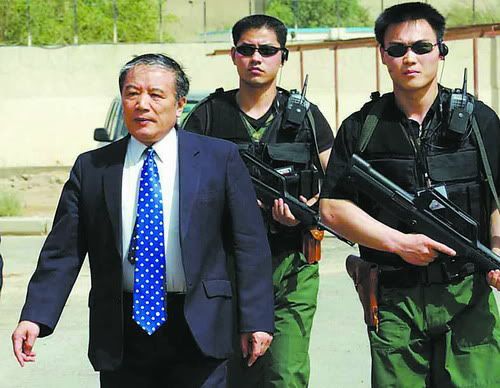Russian Prime Minister and president-elect Vladimir Putin on Wednesday supported the idea of private defense companies that would provide protection services and military training programs abroad without the participation of the Russian state.
The idea was proposed by A Just Russia deputy Alexei Mitrofanov during Putin’s report to the lower house of parliament, the State Duma.
Putin said that was “an instrument in the pursuit of national interests without the direct participation of the state.” “I believe that it should be considered, thought over,” he said. –11/04/2012 Riavososti
This is another post I wanted to get out there in regards to what has happened in the industry. The events in the Ukraine have put some more light on Russia’s use of PMSC’s, and also puts some light on how PMSC’s could be used as a propaganda tool.
Specifically, ACADEMI was mentioned in multiple propaganda pieces as supporting the Kiev government with training and ‘mercenary’ services. It was even mentioned that there were 400 elite US commandos from this company, fighting Russian separatists. lol
I am laughing because there would have been an avalanche of chatter on all of the forums and Facebook/Linkedin pages if this was true. You don’t just fire up a 400 man army like this and it not get out amongst this community. Especially if it paid well.
Even ACADEMI had to post a press releases to counter this ridiculous claim. The State Dept, who issues the licenses necessary for PMSC’s to go overseas and do training had to beat down this idiotic propaganda as well in statements. Really, I don’t think anyone in the west believed this stupid story.
But unfortunately, their propaganda efforts were able to reach those that are not savvy online or care to believe otherwise. All war is deception as Sun Tzu would say… Russia was absolutely implementing a social media campaign as a part of their battle plan to take Crimea and justify occupying parts of the Ukraine. That effort is still ongoing and we will see what eventually happens with the Ukraine.
Also expect attacks on Gazprom pipelines, and that reality will require protective services by Gazprom’s massive security apparatus.
The point is, that social media and war is standard business now, and you see combatants all over the world using social media and propaganda to prepare their battlefields and psyche out their opponents. It works if done properly, and just ask the cartels in Mexico or ISIS in Iraq how it is working out for them.
The other part of this story that is not being talked about is Russia’s focus on firing up their own private military industry. Something that can rival the west’s PMSC industry. This is very interesting to me, because it is another market to study and watch. It is also a huge money maker–private security in Russia is said to be a 7 billion dollar market.
Although there has always been a PMSC sector in Russia, and especially after the end of the Cold War. What is interesting though is that I keep picking up on hints here and there of PMSC’s getting support at some very high levels in Russia. Probably because it is a force that can be used by men in power to do things that a standing military could not do. (please note the quote by Putin up top)
For example, a company in the country of Transnistria could be contacted and asked to recruit folks to be ‘pro-Russian separatists’ in the Ukraine. To work with Russian special forces that are also posing as Russian separatists, wear ski masks to mask their identity, and fuel the grass roots movement and divisions within the country using violence. Sounds farfetched? Well that is exactly what some are speculating, and it would make sense to me, purely base off of what the leaders of Russia have said in the past.
Below I have posted recent news on efforts to further legitimize PMSC’s in Russia. To give them the legal authority necessary to operate, and to even use in other countries. This is not new and I posted stuff about Russia’s intent back in 2012. David Isenberg wrote a post on it as well. EA games did a pretty good series on PMSC’s in Russia.
Although I should note that Russia has had some recent embarrassing incidents with the use of PMSC’s in other countries. For example, The Slavonic Corps and their actions in Syria come to mind. Perhaps Russia’s recent legislation and licensing will help to control future ‘Slavonic Corps’ from happening? Who knows, but I do know that Russia is continuing to explore the many uses of private military companies and we will see where that takes them. –Matt

Russian Special Forces operating in the Ukraine and assisting separatists. They are referred to as ‘The Little Green Men’. Weapon is a 9K115 Metis ATGM.
Russian ‘Blackwater’? MPs call for local security industry loophole
June 27, 2014
By Iliya Pitalev
Nationalist party LDPR deputies have drafted a law on private military companies to the regional legislature of North Russia’s Pskov. If approved, the draft will be forwarded to the federal parliament.
The authors of the document claim it was born out of the necessity for capable and specialized commercial organizations to enforce national interests in cases when international politics or law prevent the government from using regular military forces.
“The crisis in Ukraine in which the provisionary government in Kiev is actively using Western military contractors in its interests, demonstrate the acute necessity for similar institutions in Russia,” reads the explanatory note published by the Pskov regional legislature.
According to the lawmakers, there are over 450 private military contractors in the world, with 70 percent of the services provided by the US and British companies. These firms solve many foreign policy problems for Western governments, and at the same time bring additional taxes to their national economies.
(more…)

